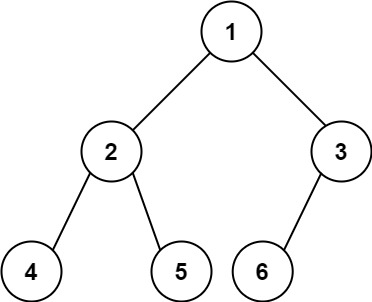222. Count Complete Tree Nodes
Easy LeetCodeGiven the root of a complete binary tree, return the number of the nodes in the tree.
According to Wikipedia, every level, except possibly the last, is completely filled in a complete binary tree, and all nodes in the last level are as far left as possible. It can have between 1 and 2^h nodes inclusive at the last level h.
Design an algorithm that runs in less than O(n) time complexity.
Example 1
Input: root = [1,2,3,4,5,6]
Output: 6
Example 2
Input: root = []
Output: 0
Example 3
Input: root = [1]
Output: 1
Constraints
- The number of nodes in the tree is in the range [0, 5 * 10^4].
- 0 <= Node.val <= 5 * 10^4
- The tree is guaranteed to be complete.
How to solve the problem
Recursion (DFS)
python
# Definition for a binary tree node.
# class TreeNode:
# def __init__(self, val=0, left=None, right=None):
# self.val = val
# self.left = left
# self.right = right
class Solution:
def countNodes(self, root: Optional[TreeNode]) -> int:
def dfs(node):
if node is None:
return 0
num_left = dfs(node.left)
num_right = dfs(node.right)
return num_left + num_right + 1
return dfs(root)- More simplified code
python
# Definition for a binary tree node.
# class TreeNode:
# def __init__(self, val=0, left=None, right=None):
# self.val = val
# self.left = left
# self.right = right
class Solution:
def countNodes(self, root: Optional[TreeNode]) -> int:
if root is None:
return 0
return self.countNodes(root.left) + self.countNodes(root.right) + 1Complexity
- Time complexity: O(n), n == number of nodes
- Space complexity: O(n)

Comments
No comments yet. Be the first to comment!